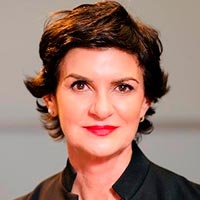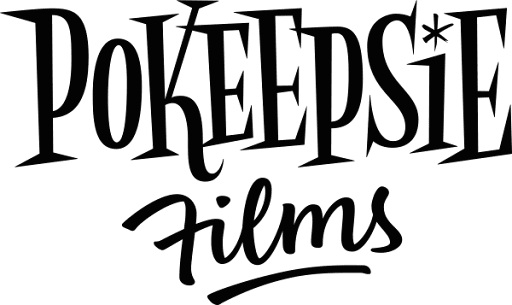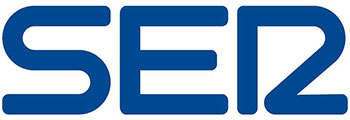Master's Degree in Sports Journalism and Broadcasting Continuing Education
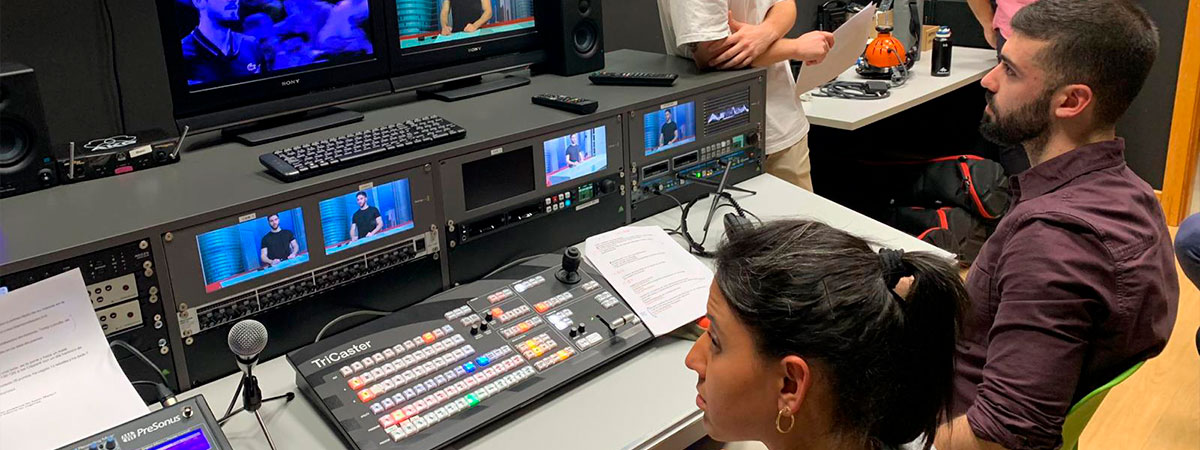
Practical education from the first day
These studies have an eminently practical nature, with subjects focused on the narration of sporting events, the presentation of programs, the role of the sports reporter, innovations in broadcasting, and the production of major sporting events. The program deals with the communication of all kinds of sporting events (football, basketball, cycling, athletics...), and pays special attention to events linked to new digital communication formulas (e-sports, new channels such as Twitch, platforms).
It covers the entire process of developing the content, from the capturing of images to the writing and speaking of texts, going through the editing of audiovisual material and the creation of infographics.
It offers an up-to-date degree, incorporating mobile journalism, social media management and transmedia narration.
Students will learn to handle the new audiovisual formats and develop the new dynamics that take place in newsrooms.
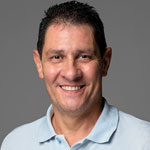 Antonio Vaquerizo Mariscal Director del Master's Degree in Continuing Education in Sports Journalism and Broadcasting
Antonio Vaquerizo Mariscal Director del Master's Degree in Continuing Education in Sports Journalism and BroadcastingThe Faculty of Communication and Arts of the Nebrija University offers you the opportunity to specialize in sports communication with the best professionals in the sector.
In an international urban Campus in the center of Madrid
Curriculum
The student must complete 60 credits
First Semester 30 ECTS
- 2 ECTS | Sports Media Industries
- 2 ECTS | Sports Law and Broadcasting Rights
- 2 ECTS | Sports programming
- 3 ECTS | Sports writing workshop
- 3 ECTS | Speech Workshop And Sports Presentation
- 2 ECTS | Advanced Camera Workshop
- 3 ECTS | Editing Workshop For Sports Articles
- 3 ECTS | Reporting Workshop
- 3 ECTS | Live broadcast workshop
- 3 ECTS | Realization Workshop
- 2 ECTS | Infographic and Data Visualization Workshop
- 2 ECTS | Trends in Sports Documentaries
Second Semester 30 ECTS
- 2 ECTS | Women and Sport
- 2 ECTS | Production of large events and special programs
- 2 ECTS | Soccer
- 2 ECTS | Motorsports
- 2 ECTS | Basketball
- 2 ECTS | Tennis
- 2 ECTS | Multisport
- 2 ECTS | Transmedia sports information and social networks
- 2 ECTS | Sport on New Platforms: Twitch
- 2 ECTS | eSports
- 4 ECTS | Professional Internship
- 6 ECTS | Master's Final Research Project
More Information of these Subjects
Professors
| Profesores Professors | Porcentaje de Doctores Percentage of PhD holders |
| 22 | 70% |
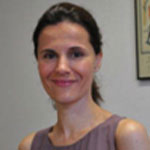 Inés Arranz Rodríguez
Directora del Máster en Dirección de Publicidad Integrada y profesora de Target, puntos de contacto y gestión de medios POEM y Planificación de medios integrada.
Director of the Master in Integrated Advertising Management and professor of Target, points of contact and media management POEM and Integrated Media Planning.
Directora del Máster en Dirección de Publicidad Integrada y profesora en la Facultad de Comunicación y Artes de la Universidad Nebrija, en Madrid. Doctora Cum Laude en Ciencias de la Información Universidad Complutense de Madrid. Máster Dirección Recursos Humanos. ESIC. Programa Superior en Digital Business y gestión de contenidos digitales. THE VALLEY. Curso Superior de Publicidad Digital. Icemd-Esic. Desarrolló su carrera profesional como directora de medios publicitarios durante veinte años en las agencias de medios Carat, Equumedia, Optimedia, Iceberg y SMA. Actualmente imparte docencia de las asignaturas Planificación de medios Laboratorio de Medios, Investigación de audiencias del Grado de Publicidad y RR.PP en la Universidad Nebrija y en las siguientes asignaturas de Máster: Estrategia de E-Marketing y Planificación de Medios On Line en el Máster en Marketing y Publicidad Digital. Target, puntos de contacto y gestión de medios POEM en el Máster en Dirección de Publicidad Integrada Planificación de Medios Integrada. Su línea de investigación se centra en la relación de la publicidad con los medios de comunicación.
Inés Arranz Rodríguez
Directora del Máster en Dirección de Publicidad Integrada y profesora de Target, puntos de contacto y gestión de medios POEM y Planificación de medios integrada.
Director of the Master in Integrated Advertising Management and professor of Target, points of contact and media management POEM and Integrated Media Planning.
Directora del Máster en Dirección de Publicidad Integrada y profesora en la Facultad de Comunicación y Artes de la Universidad Nebrija, en Madrid. Doctora Cum Laude en Ciencias de la Información Universidad Complutense de Madrid. Máster Dirección Recursos Humanos. ESIC. Programa Superior en Digital Business y gestión de contenidos digitales. THE VALLEY. Curso Superior de Publicidad Digital. Icemd-Esic. Desarrolló su carrera profesional como directora de medios publicitarios durante veinte años en las agencias de medios Carat, Equumedia, Optimedia, Iceberg y SMA. Actualmente imparte docencia de las asignaturas Planificación de medios Laboratorio de Medios, Investigación de audiencias del Grado de Publicidad y RR.PP en la Universidad Nebrija y en las siguientes asignaturas de Máster: Estrategia de E-Marketing y Planificación de Medios On Line en el Máster en Marketing y Publicidad Digital. Target, puntos de contacto y gestión de medios POEM en el Máster en Dirección de Publicidad Integrada Planificación de Medios Integrada. Su línea de investigación se centra en la relación de la publicidad con los medios de comunicación.
 José Aguilar López
Profesor de Habilidades Directivas y de Presentación
Executive and Presentation Skills Professor
Doctor en Filosofía y PDD por el IESE. En 2011 fue reconocido con el premio “Thinker” en el marco del Manager Forum (Madrid). Anteriormente obtuvo en 2006, junto a Javier Fernández Aguado, el premio del Management Internacional Forum al mejor libro de Management del año, por la obra conjunta "La soledad del directivo" (Lid, Madrid, 2006) y en 2008 el premio “Most Valuable Speaker”, concedido por Interban Network y el primer premio con el caso “Dreams Equity” en el Concurso de Casos de Negocio, organizado por la Nebrija Business School.
José Aguilar López
Profesor de Habilidades Directivas y de Presentación
Executive and Presentation Skills Professor
Doctor en Filosofía y PDD por el IESE. En 2011 fue reconocido con el premio “Thinker” en el marco del Manager Forum (Madrid). Anteriormente obtuvo en 2006, junto a Javier Fernández Aguado, el premio del Management Internacional Forum al mejor libro de Management del año, por la obra conjunta "La soledad del directivo" (Lid, Madrid, 2006) y en 2008 el premio “Most Valuable Speaker”, concedido por Interban Network y el primer premio con el caso “Dreams Equity” en el Concurso de Casos de Negocio, organizado por la Nebrija Business School.Como especialista en Dirección de Recursos Humanos, Comunicación y creación de empresa, ha dirigido seminarios y cursos en numerosas Universidades y Escuelas de Negocios de Europa y América.
Es miembro del Consejo Editorial de Executive Excellence y de otras publicaciones profesionales. Ha participado, en calidad de autor, coordinador o coautor, en quince libros. Es colaborador habitual en diarios, revistas de información económica, radio y TV y forma parte del colectivo Topten del management español (http://www.toptenms.com/). Su biografía ha sido publicada en el libros como: Grandes Creadores en la Historia del Management (Ariel), de José Luis García Ruiz; Who's who en el Management español (Interban), de Francisco Alcaide; y Quién es quién en Top Ten Speakers Spain (Thompson Reuters), coordinado por Blanca Fernández-Galiano. PhD in Philosophy and PDD from IESE. In 2011 he was recognized with the "Thinker" award in the framework of the Manager Forum (Madrid). Previously in 2006 he won, along with Javier Fernández Aguado, the Management International Forum award for the best management book of the year, for the joint work "La soledad del directivo" (Lid, Madrid, 2006) and in 2008 the "Most Valuable Speaker" award, granted by Interban Network and first prize with the "Dreams Equity" case in the Business Case Contest, organized by Nebrija Business School. As a specialist in Human Resources Management, Communication and business creation, he has directed seminars and courses in numerous Universities and Business Schools in Europe and America. He is a member of the Executive Excellence Editorial Board and other professional publications. He has participated, as author, coordinator or co-author, in fifteen books. He is a regular contributor to newspapers, economic information magazines, radio and TV and is part of the Topten collective of Spanish management (http://www.toptenms.com/). His biography has been published in books such as: Grandes Creadores en la Historia del Management (Great Creators in the History of Management) (Ariel), by José Luis García Ruiz; Who's who en el Management español (Who's who in Spanish Management) (Interban), by Francisco Alcaide; and Quién es quién en Top Ten Speakers Spain (Who's Who in Top Ten Speakers Spain) (Thompson Reuters), coordinated by Blanca Fernández-Galiano .
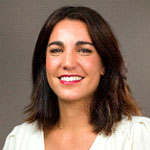 María Bergaz Portolés Díaz
Profesora de Planificación de medios integrada
Professor of Integrated Media Planning
Doctora en Ciencias de la Comunicación y Profesora de la Universidad Antonio de Nebrija. Licenciada en Publicidad y RR.PP e Investigación y Técnicas de Mercado, con Diploma en Estudios Empresariales por la Universidad Antonio de Nebrija. Master en Dirección de Comunicación por la Universidad Católica San Antonio de Murcia (UCAM).
Profesionalmente, trabajó en la agencia de medios Carat, en el Departamento de Servicios al Cliente Internacional con anunciantes como Disney, SCA, Glaxo Smithkline, Delaviuda o Yves Rocher.
Desde el año 2008 imparte docencia en los grados de Publicidad y Relaciones Públicas, Periodismo y Comunicación Audiovisual, de las áreas de: medios de comunicación, estrategia y planificación de medios, e investigación de audiencias.
María Bergaz Portolés Díaz
Profesora de Planificación de medios integrada
Professor of Integrated Media Planning
Doctora en Ciencias de la Comunicación y Profesora de la Universidad Antonio de Nebrija. Licenciada en Publicidad y RR.PP e Investigación y Técnicas de Mercado, con Diploma en Estudios Empresariales por la Universidad Antonio de Nebrija. Master en Dirección de Comunicación por la Universidad Católica San Antonio de Murcia (UCAM).
Profesionalmente, trabajó en la agencia de medios Carat, en el Departamento de Servicios al Cliente Internacional con anunciantes como Disney, SCA, Glaxo Smithkline, Delaviuda o Yves Rocher.
Desde el año 2008 imparte docencia en los grados de Publicidad y Relaciones Públicas, Periodismo y Comunicación Audiovisual, de las áreas de: medios de comunicación, estrategia y planificación de medios, e investigación de audiencias.
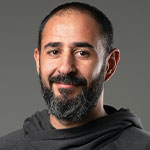 Javier Díaz-Masa Gutiérrez
Profesor de Dirección creativa estratégica y desarrollo de la innovación
Professor of Strategic Creative Management and Innovation Development
Licenciado en Publicidad y Relaciones Públicas con Diploma en Estudios Empresariales por la Universidad Nebrija. Máster en Creatividad y Estrategia por School Agency. Máster en Formación de Profesorado por Nebrija. Profesor en el Grado de Marketing, Grado de Publicidad y RRPP y Máster de Dirección de Publicidad Integrada / Coordinador del Grado Superior de Formación Profesional de Marketing y Publicidad.
Asignaturas: Storytelling y branded content / Narrativa transmedia y branded content / Técnicas de creatividad, emprendimiento e innovación / Dirección creativa estratégica y desarrollo de innovación / Políticas de marketing / Diseño y elaboración de material de comunicación.
Lleva 20 años trabajando como creativo en agencias de publicidad como Sra. Rushmore, Young&Rubicam, SCPF, Wunderman Thompson o MC Saatchi, ocupando el cargo de director creativo desde 2018.
Ha trabajado para marcas como BMW, Banco Sabadell, Vodafone, El Corte Inglés, Repsol, Movistar, Antena 3 o Ron Santa Teresa, siendo su trabajo reconocido en festivales como Cannes Lions, El Sol, EFI, Laus o CdeC.
Ha sido Jurado en los Premios Nacionales de Creatividad en 2017 y en los Premios Inspirational IAB 2020.
Co-autor del libro “El Branded Content en la comunicación posdigital: estructuras, aplicaciones y casos de éxito”. Ed. Tirant Lo Blanch (2021).
Desde 2019 colabora como profesor en Nebrija, impartiendo asignaturas centradas en creatividad, marketing, estrategia, emprendimiento e innovación.
Javier Díaz-Masa Gutiérrez
Profesor de Dirección creativa estratégica y desarrollo de la innovación
Professor of Strategic Creative Management and Innovation Development
Licenciado en Publicidad y Relaciones Públicas con Diploma en Estudios Empresariales por la Universidad Nebrija. Máster en Creatividad y Estrategia por School Agency. Máster en Formación de Profesorado por Nebrija. Profesor en el Grado de Marketing, Grado de Publicidad y RRPP y Máster de Dirección de Publicidad Integrada / Coordinador del Grado Superior de Formación Profesional de Marketing y Publicidad.
Asignaturas: Storytelling y branded content / Narrativa transmedia y branded content / Técnicas de creatividad, emprendimiento e innovación / Dirección creativa estratégica y desarrollo de innovación / Políticas de marketing / Diseño y elaboración de material de comunicación.
Lleva 20 años trabajando como creativo en agencias de publicidad como Sra. Rushmore, Young&Rubicam, SCPF, Wunderman Thompson o MC Saatchi, ocupando el cargo de director creativo desde 2018.
Ha trabajado para marcas como BMW, Banco Sabadell, Vodafone, El Corte Inglés, Repsol, Movistar, Antena 3 o Ron Santa Teresa, siendo su trabajo reconocido en festivales como Cannes Lions, El Sol, EFI, Laus o CdeC.
Ha sido Jurado en los Premios Nacionales de Creatividad en 2017 y en los Premios Inspirational IAB 2020.
Co-autor del libro “El Branded Content en la comunicación posdigital: estructuras, aplicaciones y casos de éxito”. Ed. Tirant Lo Blanch (2021).
Desde 2019 colabora como profesor en Nebrija, impartiendo asignaturas centradas en creatividad, marketing, estrategia, emprendimiento e innovación.
 Marta González Caballero
Profesora de Prácticas Profesionales
Professor of Professional Internships
Doctora en Comunicación Audiovisual por la UCM. Acreditada por ANECA y Licenciada en Ciencias de la Información por la misma Universidad. Diplomada en el CAP por la Facultad de Ciencias de la Educación, con especialización en Didáctica de los medios audiovisuales. Profesora Universitaria desde 1998, ha realizado su labor docente en universidades públicas y privadas y en la Escuela de Cinematografía y del Audiovisual de la Comunidad de Madrid (ECAM). Ha trabajado como operadora de cámara en el Congreso de los Diputados y en los Servicios informativos de TVE. Ha desarrollado gran parte de su experiencia profesional en el ámbito de la producción audiovisual para “M&m Producciones”, realizando piezas publicitarias, videoclips y proyectos multimedia. Desde hace dos años, colabora con el Estudio de diseño Dynarange como Audiovisual Manager en Organización de eventos. Ha realizado colaboraciones para Editorial Scriptum y para JC Libros de cine.
Marta González Caballero
Profesora de Prácticas Profesionales
Professor of Professional Internships
Doctora en Comunicación Audiovisual por la UCM. Acreditada por ANECA y Licenciada en Ciencias de la Información por la misma Universidad. Diplomada en el CAP por la Facultad de Ciencias de la Educación, con especialización en Didáctica de los medios audiovisuales. Profesora Universitaria desde 1998, ha realizado su labor docente en universidades públicas y privadas y en la Escuela de Cinematografía y del Audiovisual de la Comunidad de Madrid (ECAM). Ha trabajado como operadora de cámara en el Congreso de los Diputados y en los Servicios informativos de TVE. Ha desarrollado gran parte de su experiencia profesional en el ámbito de la producción audiovisual para “M&m Producciones”, realizando piezas publicitarias, videoclips y proyectos multimedia. Desde hace dos años, colabora con el Estudio de diseño Dynarange como Audiovisual Manager en Organización de eventos. Ha realizado colaboraciones para Editorial Scriptum y para JC Libros de cine.
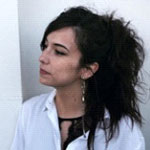 Sara Larios Talán
Profesora de Creación de contenido de marca (Branded content)
Professor of Branded Content Creation (Branded content)
Profesora de Branded Content en el Máster en Dirección de Publicidad Integrada. Graduada en Publicidad y Relaciones Públicas en la Universidad Rey Juan Carlos y actual profesora asociada de dicha universidad impartiendo las asignaturas de “Creatividad en la elaboración del mensaje publicitario” y “Planificación Estratégica Publicitaria”. Estudios complementarios: Máster de Publicidad y Comunicación digital en IAB Spain; Máster en Creatividad Publicitaria en la escuela Zink Project; y Máster en Narración y Escritura creativa en Sefhor. Ganadora en la categoría Young Lions Media España 2022 en el Festival Internacional de Publicidad Cannes Lions. En paralelo, redactora creativa senior y guionista en The Story Lab, la agencia de contenidos digitales de la agencia de medios Dentsu. Especializada en la ideación, conceptualización, guionización y ejecución de proyectos digitales para grandes marcas.
Sara Larios Talán
Profesora de Creación de contenido de marca (Branded content)
Professor of Branded Content Creation (Branded content)
Profesora de Branded Content en el Máster en Dirección de Publicidad Integrada. Graduada en Publicidad y Relaciones Públicas en la Universidad Rey Juan Carlos y actual profesora asociada de dicha universidad impartiendo las asignaturas de “Creatividad en la elaboración del mensaje publicitario” y “Planificación Estratégica Publicitaria”. Estudios complementarios: Máster de Publicidad y Comunicación digital en IAB Spain; Máster en Creatividad Publicitaria en la escuela Zink Project; y Máster en Narración y Escritura creativa en Sefhor. Ganadora en la categoría Young Lions Media España 2022 en el Festival Internacional de Publicidad Cannes Lions. En paralelo, redactora creativa senior y guionista en The Story Lab, la agencia de contenidos digitales de la agencia de medios Dentsu. Especializada en la ideación, conceptualización, guionización y ejecución de proyectos digitales para grandes marcas.
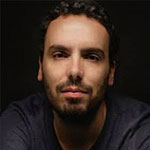 Alberto Martín García
Profesor de Investigación, analítica web y control de eficacia
Professor of Research, web analytics and efficiency control
Doctor en Comunicación y licenciado en Publicidad y Relaciones Públicas por la Universidad de Valladolid. Tiene más de una década de experiencia como community manager de forma autónoma y es profesor asociado en el Campus María Zambrano en Segovia, de la Universidad de Valladolid, donde imparte las asignaturas de Estructura del sistema publicitario e ideas, métodos y estrategias creativas. Es escritor literario y su tercera novela 'El silencio de Raquel' (Caligrama,2018), fue galardonada con el Premio Talento Caligrama y reeditada en 2021 por Ediciones B, del grupo Penguin Random House.
Alberto Martín García
Profesor de Investigación, analítica web y control de eficacia
Professor of Research, web analytics and efficiency control
Doctor en Comunicación y licenciado en Publicidad y Relaciones Públicas por la Universidad de Valladolid. Tiene más de una década de experiencia como community manager de forma autónoma y es profesor asociado en el Campus María Zambrano en Segovia, de la Universidad de Valladolid, donde imparte las asignaturas de Estructura del sistema publicitario e ideas, métodos y estrategias creativas. Es escritor literario y su tercera novela 'El silencio de Raquel' (Caligrama,2018), fue galardonada con el Premio Talento Caligrama y reeditada en 2021 por Ediciones B, del grupo Penguin Random House.
 Luis Munné García Muro
Profesor de Creatividad Integrada.
Integrated Creativity Professor.
Licenciado en CC. Económicas y Empresariales por la UAM. Master en Internet Business por el ISDI.
Director creativo digital en TBWA. Soy experto en la construcción y desarrollo de marcas/productos a través de un planteamiento estratégico sólido que se concreta en ideas potentes para cualquier medio. Desarrollo proyectos relacionados con todos los aspectos del marketing digital: buscadores, redes sociales, apps móviles o acciones creativas transmedia. Por mi experiencia en empresas de comunicación tanto en el departamento de cuentas/estrategia como en el departamento creativo mi objetivo es siempre hacer compatible la excelencia creativa con la orientación a resultados.
He trabajado en agencias como Saatchi & Saatchi, Young & Rubicam, Bozell o Havas Worldwide para clientes como Procter & Gamble, British Airways, Chrysler Jeep iberia, Peugeot, Telefónica, Repsol o PlayStation.
Luis Munné García Muro
Profesor de Creatividad Integrada.
Integrated Creativity Professor.
Licenciado en CC. Económicas y Empresariales por la UAM. Master en Internet Business por el ISDI.
Director creativo digital en TBWA. Soy experto en la construcción y desarrollo de marcas/productos a través de un planteamiento estratégico sólido que se concreta en ideas potentes para cualquier medio. Desarrollo proyectos relacionados con todos los aspectos del marketing digital: buscadores, redes sociales, apps móviles o acciones creativas transmedia. Por mi experiencia en empresas de comunicación tanto en el departamento de cuentas/estrategia como en el departamento creativo mi objetivo es siempre hacer compatible la excelencia creativa con la orientación a resultados.
He trabajado en agencias como Saatchi & Saatchi, Young & Rubicam, Bozell o Havas Worldwide para clientes como Procter & Gamble, British Airways, Chrysler Jeep iberia, Peugeot, Telefónica, Repsol o PlayStation.
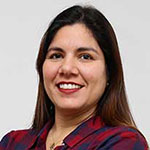 Eglée Ortega Fernández
Profesora de Social media Strategy
Professor of Social media strategy
Doctora en Comunicación Audiovisual, Publicidad y Relaciones Públicas. Profesora Acreditado por ANECA. Especializada en las áreas de marketing digital, posicionamiento de clientes (SEO), publicidad digital (SEM), redes sociales, optimización de contenidos, nuevas audiencias, comunicación corporativa y comunicación política. Ha sido coordinadora los másteres oficiales de ID Digital School, consultora de marketing digital en la agencia Top Position, coordinadora del Gabinete de Prensa del Partido Voluntad Popular y del político venezolano Leopoldo López (2011); Jefe y asistente del gabinete de prensa en los Institutos de Policía en los distritos de Chacao y Baruta en Venezuela, desde 2005 hasta 2009; asistente del embajador y de la sección de Prensa y Cultura en la oficina de la Unión Europea en Venezuela en 2010; y actualmente, miembro de la Asociación de Periodistas Venezuelan Press.
Eglée Ortega Fernández
Profesora de Social media Strategy
Professor of Social media strategy
Doctora en Comunicación Audiovisual, Publicidad y Relaciones Públicas. Profesora Acreditado por ANECA. Especializada en las áreas de marketing digital, posicionamiento de clientes (SEO), publicidad digital (SEM), redes sociales, optimización de contenidos, nuevas audiencias, comunicación corporativa y comunicación política. Ha sido coordinadora los másteres oficiales de ID Digital School, consultora de marketing digital en la agencia Top Position, coordinadora del Gabinete de Prensa del Partido Voluntad Popular y del político venezolano Leopoldo López (2011); Jefe y asistente del gabinete de prensa en los Institutos de Policía en los distritos de Chacao y Baruta en Venezuela, desde 2005 hasta 2009; asistente del embajador y de la sección de Prensa y Cultura en la oficina de la Unión Europea en Venezuela en 2010; y actualmente, miembro de la Asociación de Periodistas Venezuelan Press.
 Elvira María Pacheco Ortega
Profesora de Creación y estrategia de marca (Branding)
Professor of Brand Creation and Strategy (Branding)
Doctora en Ciencias. de la Información por la Universidad Complutense de Madrid en la que se licenció en Publicidad y RRPP. Su tesis doctoral, Dimensión ecológica en la nueva mercadotecnia, que obtuvo la calificación de Sobresaliente Cum Laude, constituye un acercamiento teórico al marketing ecológico.
Ha sido docente en el curso de Marketing Ecológico del CEPADE de la Universidad Politécnica de Madrid.
Desde hace 19 años trabaja en el Departamento de Marketing de Leroy Merlin. Actualmente lidera los equipos de Marca, Publicidad y Relaciones Públicas. Desde su misión, gestiona la marca, desarrolla la estrategia de comunicación e impulsa el alineamiento de las campañas de comunicación con los valores y el propósito de la marca.
También ha trabajado en Quiero Televisión, Telefónica B2B y Wunderman (Grupo WPP).
Elvira María Pacheco Ortega
Profesora de Creación y estrategia de marca (Branding)
Professor of Brand Creation and Strategy (Branding)
Doctora en Ciencias. de la Información por la Universidad Complutense de Madrid en la que se licenció en Publicidad y RRPP. Su tesis doctoral, Dimensión ecológica en la nueva mercadotecnia, que obtuvo la calificación de Sobresaliente Cum Laude, constituye un acercamiento teórico al marketing ecológico.
Ha sido docente en el curso de Marketing Ecológico del CEPADE de la Universidad Politécnica de Madrid.
Desde hace 19 años trabaja en el Departamento de Marketing de Leroy Merlin. Actualmente lidera los equipos de Marca, Publicidad y Relaciones Públicas. Desde su misión, gestiona la marca, desarrolla la estrategia de comunicación e impulsa el alineamiento de las campañas de comunicación con los valores y el propósito de la marca.
También ha trabajado en Quiero Televisión, Telefónica B2B y Wunderman (Grupo WPP).
 Emilio Palomares de Miguel
Profesor de Dirección de cuentas (cliente y proceso)
Professor of Account Management (customer and process)
Licenciado en Publicidad y RR.PP. por la Universidad de Valladolid y Experto en planificación estratégica y creatividad por la Universidad Complutense de Madrid.
Con más de 10 años de experiencia en el sector de la publicidad ha trabajado en diferentes agencias de publicidad nacionales e internacionales como JWT, Darwin and Co, Ogilvy y TBWA, con una amplia experiencia en la gestión y desarrollo de campañas integrales (TV, OOH, gráfica, digital, radio, PLV, RRSS influencers y AA.EE)
En la actualidad trabaja en TBWA como director de cuentas del área LSM para la cuenta de McDonald’s y previamente ha trabajado para multitud de marcas de diferentes sectores como: Iberia, Nutribén, Apple, Vichy (L´Oréal), Diario As, Rastreator, Clínicas Londres, Rolex, Paradores y Telepizza entre otros.
Emilio Palomares de Miguel
Profesor de Dirección de cuentas (cliente y proceso)
Professor of Account Management (customer and process)
Licenciado en Publicidad y RR.PP. por la Universidad de Valladolid y Experto en planificación estratégica y creatividad por la Universidad Complutense de Madrid.
Con más de 10 años de experiencia en el sector de la publicidad ha trabajado en diferentes agencias de publicidad nacionales e internacionales como JWT, Darwin and Co, Ogilvy y TBWA, con una amplia experiencia en la gestión y desarrollo de campañas integrales (TV, OOH, gráfica, digital, radio, PLV, RRSS influencers y AA.EE)
En la actualidad trabaja en TBWA como director de cuentas del área LSM para la cuenta de McDonald’s y previamente ha trabajado para multitud de marcas de diferentes sectores como: Iberia, Nutribén, Apple, Vichy (L´Oréal), Diario As, Rastreator, Clínicas Londres, Rolex, Paradores y Telepizza entre otros.
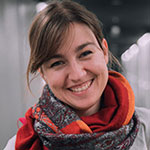 Amanda Zita Pons Pérez
Profesora de Social media strategy
Professor of Social media strategy
Licenciada en Comunicación Audiovisual por la Universidad Complutense de Madrid y Máster en Creatividad Publicitaria en Zink!. Antes de su llegada a la publicidad trabajó como directora de producción en proyectos cinematográficos a nivel nacional e internacional y dirigió las Jornadas de Webseries y el Festival Español de Webseries. Con más de 9 años de experiencia, en el 2014 ganó el Sol de Oro a Jóvenes Creativos para el cliente Nescafé y cuenta con otros premios de festivales como Inspirational, El Sol o EFI. Ha trabajado para Havas, BTOB, TBWA y Xiaomi, en el que fue la Marketing Manager de POCO en España. Colabora en la asociación de Innovación Audiovisual donde investiga sobre contenido y storytelling y está desarrollando su doctorado en Comunicación, Publicidad y Relaciones Públicas en la Universidad Complutense de Madrid. Compagina su investigación con proyectos de consultoría que abordan el desarrollo de estrategias de contenido y redes sociales.
Amanda Zita Pons Pérez
Profesora de Social media strategy
Professor of Social media strategy
Licenciada en Comunicación Audiovisual por la Universidad Complutense de Madrid y Máster en Creatividad Publicitaria en Zink!. Antes de su llegada a la publicidad trabajó como directora de producción en proyectos cinematográficos a nivel nacional e internacional y dirigió las Jornadas de Webseries y el Festival Español de Webseries. Con más de 9 años de experiencia, en el 2014 ganó el Sol de Oro a Jóvenes Creativos para el cliente Nescafé y cuenta con otros premios de festivales como Inspirational, El Sol o EFI. Ha trabajado para Havas, BTOB, TBWA y Xiaomi, en el que fue la Marketing Manager de POCO en España. Colabora en la asociación de Innovación Audiovisual donde investiga sobre contenido y storytelling y está desarrollando su doctorado en Comunicación, Publicidad y Relaciones Públicas en la Universidad Complutense de Madrid. Compagina su investigación con proyectos de consultoría que abordan el desarrollo de estrategias de contenido y redes sociales.
 María del Mar Ramos Rodríguez
Profesora de Diseño y dirección de arte
Design and art direction
Doctora en Bellas Artes por la Universidad Complutense de Madrid. Licenciada en Ciencias de la Imagen y Sonido por la misma universidad. Su práctica profesional se ha desarrollado en el mundo de la fotografía, la producción audiovisual y el diseño gráfico y editorial. Destaca su experiencia laboral en el mundo de la publicidad cinematográfica, en estudios de diseño y en la productora cinematográfica CineCompany, así como en las empresas de comunicación editorial Grupo Zeta y Vocento. En la Universidad Antonio de Nebrija imparte docencia desde 1998 en programas de grado y postgrado en las áreas de Comunicación Audiovisual, Periodismo y Publicidad al tiempo que lo compagina con proyectos gráficos y audiovisuales para empresas e instituciones.
María del Mar Ramos Rodríguez
Profesora de Diseño y dirección de arte
Design and art direction
Doctora en Bellas Artes por la Universidad Complutense de Madrid. Licenciada en Ciencias de la Imagen y Sonido por la misma universidad. Su práctica profesional se ha desarrollado en el mundo de la fotografía, la producción audiovisual y el diseño gráfico y editorial. Destaca su experiencia laboral en el mundo de la publicidad cinematográfica, en estudios de diseño y en la productora cinematográfica CineCompany, así como en las empresas de comunicación editorial Grupo Zeta y Vocento. En la Universidad Antonio de Nebrija imparte docencia desde 1998 en programas de grado y postgrado en las áreas de Comunicación Audiovisual, Periodismo y Publicidad al tiempo que lo compagina con proyectos gráficos y audiovisuales para empresas e instituciones.
 Francisco Jaime Reyes Sánchez
Profesor de Producción de contenidos publicitarios
Professor of production of advertising content
Profesor en la Facultad de Ciencias de la Información de la Universidad Complutense de Madrid desde el curso 2000-2001. Doctor en Ciencias de la Información por la Universidad Complutense de Madrid (2003, Sobresaliente Cum Laude).
Creó la, primera y única hasta la fecha, asignatura sobre Cultura Urbana en la Universidad española en el curso 2005-2006 (Graffiti, hip hop y medios de comunicación),
En 2010 publicó el primer y único libro de música en la Cultura Urbana hasta la fecha en español, titulado: Rap, 25 años de rimas, que llegó a situarse en el top 10 de ventas ese año y se vendieron más de 60.000 ejemplares en todo el mundo. Ha publicado tres libros, 14 capítulos de libros, 10 artículos indexados y situados en repositorios de calidad, dos libros de actas en congresos científicos y 555 artículos sobre Cultura Urbana en la creación
Francisco Jaime Reyes Sánchez
Profesor de Producción de contenidos publicitarios
Professor of production of advertising content
Profesor en la Facultad de Ciencias de la Información de la Universidad Complutense de Madrid desde el curso 2000-2001. Doctor en Ciencias de la Información por la Universidad Complutense de Madrid (2003, Sobresaliente Cum Laude).
Creó la, primera y única hasta la fecha, asignatura sobre Cultura Urbana en la Universidad española en el curso 2005-2006 (Graffiti, hip hop y medios de comunicación),
En 2010 publicó el primer y único libro de música en la Cultura Urbana hasta la fecha en español, titulado: Rap, 25 años de rimas, que llegó a situarse en el top 10 de ventas ese año y se vendieron más de 60.000 ejemplares en todo el mundo. Ha publicado tres libros, 14 capítulos de libros, 10 artículos indexados y situados en repositorios de calidad, dos libros de actas en congresos científicos y 555 artículos sobre Cultura Urbana en la creación
 Juana Rubio Romero
Profesora de Trabajo Fin de máster
Professor of Master's Final Project
Profesora Doctora Acreditada. Licenciada en Psicología. Doctora en Filosofía. Profesora e investigadora en la Facultad de Comunicación y Artes desde 1996. Su especialización son los Métodos de Investigación y la Psicología aplicados a la comunicación y al consumo. Experiencia profesional en investigación social y de mercado. Ha ejercido en diversos puestos de responsabilidad como investigadora cualitativista para Institutos de Investigación, Agencias de Publicidad y clientes directos. Ha dirigido durante cinco años el Curso de Investigación en Marketing, que organiza AEDEMO. Ha participado en numerosos congresos nacionales e internaciones, como ponente y formando parte del comité organizador. Sus publicaciones más relevantes son documentos técnicos de investigación social.
Juana Rubio Romero
Profesora de Trabajo Fin de máster
Professor of Master's Final Project
Profesora Doctora Acreditada. Licenciada en Psicología. Doctora en Filosofía. Profesora e investigadora en la Facultad de Comunicación y Artes desde 1996. Su especialización son los Métodos de Investigación y la Psicología aplicados a la comunicación y al consumo. Experiencia profesional en investigación social y de mercado. Ha ejercido en diversos puestos de responsabilidad como investigadora cualitativista para Institutos de Investigación, Agencias de Publicidad y clientes directos. Ha dirigido durante cinco años el Curso de Investigación en Marketing, que organiza AEDEMO. Ha participado en numerosos congresos nacionales e internaciones, como ponente y formando parte del comité organizador. Sus publicaciones más relevantes son documentos técnicos de investigación social.
 Diana Sánchez Serrano
Profesora de Dirección creativa estratégica y desarrollo de la innovación
Professor of Strategic Creative Management and Innovation Development
Doctora Cum Laude en Publicidad y Comunicación Aplicada por la UCM, donde también cursó el Máster en Escritura Creativa y completó su licenciatura en Publicidad y RR.PP.
Especialista en redacción publicitaria y creatividad con más de una década de experiencia en agencias nacionales e internacionales ha compaginado la actividad profesional con la docencia en grado y postgrado. Directora del Grado en Publicidad y Relaciones públicas.
Entre sus principales líneas de investigación destacan los estudios sobre creatividad social, la culturización social de las marcas o la idoneidad de estrategias en culturas contemporáneas. Y sus últimas publicaciones ponen el foco en la relación de las marcas con el consumidor:
Diana Sánchez Serrano
Profesora de Dirección creativa estratégica y desarrollo de la innovación
Professor of Strategic Creative Management and Innovation Development
Doctora Cum Laude en Publicidad y Comunicación Aplicada por la UCM, donde también cursó el Máster en Escritura Creativa y completó su licenciatura en Publicidad y RR.PP.
Especialista en redacción publicitaria y creatividad con más de una década de experiencia en agencias nacionales e internacionales ha compaginado la actividad profesional con la docencia en grado y postgrado. Directora del Grado en Publicidad y Relaciones públicas.
Entre sus principales líneas de investigación destacan los estudios sobre creatividad social, la culturización social de las marcas o la idoneidad de estrategias en culturas contemporáneas. Y sus últimas publicaciones ponen el foco en la relación de las marcas con el consumidor: - “La publicidad como fuente socializadora en materia familiar: El caso IKEA (1996-2012)”. Revista Mediaciones Sociales, vol 17 (2018)
- Convertirse en Love Brand, desde la culturización social. El caso IKEA (2010-2020) Pendiente de publicación
- La importancia en la estrategia de contenidos y distribución en la eficacia del branded content. El caso Aprendemos Juntos, de BBVA. Pendiente de publicación.
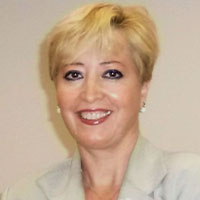 Beatriz Sanjurjo Rebollo
Profesora de Normativa y Regulación Profesional
Professional Norms and Regulations Professor
Doctora cum laude en Derecho por la Universidad Autónoma de Madrid. Profesora Acreditada por ANECA. Licenciada en Derecho por la Universidad Autónoma de Madrid. Diploma de Especialización en Derecho Constitucional y Ciencias Políticas por el Centro de Estudios Políticos y Constitucionales. Dirección de Personal y Recursos Humanos por la Escuela de Organización Industrial. Dirección y Gestión Empresarial por la Universidad Politécnica de Madrid. Experta en Comercio Internacional por la Universidad Autónoma de Madrid. Académica correspondiente de la Real Academia de Jurisprudencia y Legislación. Abogada en ejercicio del Ilustre Colegio de Abogados de Madrid y profesora universitaria de Derecho. Especialista en Derecho de la Información y Nuevas Tecnologías.
Beatriz Sanjurjo Rebollo
Profesora de Normativa y Regulación Profesional
Professional Norms and Regulations Professor
Doctora cum laude en Derecho por la Universidad Autónoma de Madrid. Profesora Acreditada por ANECA. Licenciada en Derecho por la Universidad Autónoma de Madrid. Diploma de Especialización en Derecho Constitucional y Ciencias Políticas por el Centro de Estudios Políticos y Constitucionales. Dirección de Personal y Recursos Humanos por la Escuela de Organización Industrial. Dirección y Gestión Empresarial por la Universidad Politécnica de Madrid. Experta en Comercio Internacional por la Universidad Autónoma de Madrid. Académica correspondiente de la Real Academia de Jurisprudencia y Legislación. Abogada en ejercicio del Ilustre Colegio de Abogados de Madrid y profesora universitaria de Derecho. Especialista en Derecho de la Información y Nuevas Tecnologías.
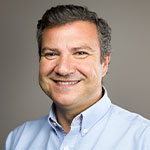 Fernando Toledano Cuervas-Mons
Profesor de Producción de contenidos publicitarios
Professor of Production of advertising content
Director del Departamento de Publicidad y profesor permanente de la Facultad de Artes y Comunicación.
Acreditado por ANECA en las figuras de profesor contratado doctor, profesor de universidad privada y profesor ayudante doctor.
Doctor en Ciencias de la Información por la Universidad Complutense de Madrid. Master en Publicidad por ICADE (Universidad Comillas). Licenciado en Ciencias de la Información por la UCM, especialidad en Comunicación audiovisual.
Ha trabajado en Gardoqui-Gold; Publicis y RdA Comunicación. Ha sido docente en el Curso de Creatividad Publicitaria y de la Comunicación del IED (Istituto Europeo di Design). Pertenece al Comité́ Ejecutivo del Capitulo Académico de la IAA (International Advertising Association). Ha sido Director del Grado en Publicidad y RR.PP. y del Grado en Marketing y Comunicación Comercial.
Fernando Toledano Cuervas-Mons
Profesor de Producción de contenidos publicitarios
Professor of Production of advertising content
Director del Departamento de Publicidad y profesor permanente de la Facultad de Artes y Comunicación.
Acreditado por ANECA en las figuras de profesor contratado doctor, profesor de universidad privada y profesor ayudante doctor.
Doctor en Ciencias de la Información por la Universidad Complutense de Madrid. Master en Publicidad por ICADE (Universidad Comillas). Licenciado en Ciencias de la Información por la UCM, especialidad en Comunicación audiovisual.
Ha trabajado en Gardoqui-Gold; Publicis y RdA Comunicación. Ha sido docente en el Curso de Creatividad Publicitaria y de la Comunicación del IED (Istituto Europeo di Design). Pertenece al Comité́ Ejecutivo del Capitulo Académico de la IAA (International Advertising Association). Ha sido Director del Grado en Publicidad y RR.PP. y del Grado en Marketing y Comunicación Comercial.• Toledano, F. Selva, D. y Díaz-Masa, J. (2021). La transformación digital de la comunicación: nuevas fórmulas de creación, producción y distribución de contenidos de marca. Valencia: Tirant Lo Blanch.
• Toledano, F., Olivares, J. y Santacruz, N. (2020). Nuevos perfiles profesionales y su integración en la industria publicitaria: de la transformación digital aun nuevo modelo de agencia en Sociedad digital & empleabilidad en comunicación. Salamanca: Comunicación social.
• Toledano, F. y de Miguel, M. (2018). Storytelling y Storydoing: técnicas narrativas para la creación de experiencias publicitarias en Creatividad en Publicidad: Del impacto al comparto. Madrid: Dykinson.
• Toledano, F. y Núñez, P. (2017). La formación de la creatividad: una instantánea de los grados universitarios en El creativo publicitario en la era digital. Madrid: Síntesis.
• Toledano, F., Miguel, B. y Grijalba, N. (2016). La transformación de la industria publicitaria: nuevos perfiles y competencias del creativo publicitario. Madrid: Dykinson.
• Toledano, F.; Polo, S. (2015). Presencia, respuesta, generación y sugerencia (PRGS) en campañas publicitarias en redes sociales. En Comunicación e interactividad. ACCI. Paginas 513-530.
• Toledano, F.; Miguel, B. (2015). Herramientas de marketing de contenido para la generación de trafico cualificado online. Opción. Vol. 31. Páginas 978-996. • Toledano, F.; Grijalba, N. (2011). El entretenimiento como estrategia de comunicación. En Investigaciones educomunicativas en la sociedad multipantalla. Fragua. Páginas 273-286.
• Toledano, F. (2010). El diseño del anuncio gráfico publicitario en medios convencionales: un análisis del método de trabajo del director de arte. Tesis doctoral.
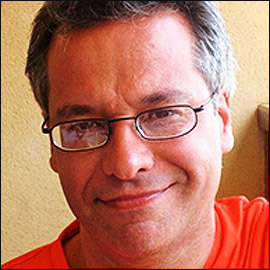 Pablo Vázquez Cagiao
Profesor de Planificación estratégica: account planning
Professor of Strategic Planning: account planning
Licenciado en CC de la Información por la UCM y Máster en Internet Business por ISDI. Su carrera profesional se ha desarrollado en el área del emprendimiento digital y la consultoría de marketing, simultaneando proyectos en empresas del sector.
Es director de Marketing online de la agencia Zeta Punto Comunicación, donde también ha dirigido proyectos de ecommerce como la tienda del concesionario Audi, VW, Skoda, F.Tomé, Laboratorios Farmasierra, Conserva Selección, Gafas de Sol Store, Alex and Ani, etc.
Pablo Vázquez Cagiao
Profesor de Planificación estratégica: account planning
Professor of Strategic Planning: account planning
Licenciado en CC de la Información por la UCM y Máster en Internet Business por ISDI. Su carrera profesional se ha desarrollado en el área del emprendimiento digital y la consultoría de marketing, simultaneando proyectos en empresas del sector.
Es director de Marketing online de la agencia Zeta Punto Comunicación, donde también ha dirigido proyectos de ecommerce como la tienda del concesionario Audi, VW, Skoda, F.Tomé, Laboratorios Farmasierra, Conserva Selección, Gafas de Sol Store, Alex and Ani, etc.Actualmente tiene una fuerte especialización en Mobile Marketing en la empresa Reinicia, donde implementa campañas, apps y webs mobile para clientes como Ono, Domino’s Pizza, Bosch, Mahou, Sanitas y Turismo de Andorra.
Adicionalmente, lleva la Dirección Comercial de Pangea Reality, la primera empresa especializada en App con un alto componente en realidad aumentada mobile en España.
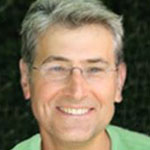 Angel Zaragoza Garcia
Profesor de Mobile Marketing y Nuevas Tendencias Online
Mobile Marketing and New Communication Trends Professor
Licenciado en CC de la Información por la UCM y Máster en Internet Business por ISDI. Su carrera profesional se ha desarrollado en el área del emprendimiento digital y la consultoría de marketing, simultaneando proyectos en empresas del sector.
Es director de Marketing online de la agencia Zeta Punto Comunicación, donde también ha dirigido proyectos de ecommerce como la tienda del concesionario Audi, VW, Skoda, F.Tomé, Laboratorios Farmasierra, Conserva Selección, Gafas de Sol Store, Alex and Ani, etc.
Angel Zaragoza Garcia
Profesor de Mobile Marketing y Nuevas Tendencias Online
Mobile Marketing and New Communication Trends Professor
Licenciado en CC de la Información por la UCM y Máster en Internet Business por ISDI. Su carrera profesional se ha desarrollado en el área del emprendimiento digital y la consultoría de marketing, simultaneando proyectos en empresas del sector.
Es director de Marketing online de la agencia Zeta Punto Comunicación, donde también ha dirigido proyectos de ecommerce como la tienda del concesionario Audi, VW, Skoda, F.Tomé, Laboratorios Farmasierra, Conserva Selección, Gafas de Sol Store, Alex and Ani, etc.Actualmente tiene una fuerte especialización en Mobile Marketing en la empresa Reinicia, donde implementa campañas, apps y webs mobile para clientes como Ono, Domino’s Pizza, Bosch, Mahou, Sanitas y Turismo de Andorra.
Adicionalmente, lleva la Dirección Comercial de Pangea Reality, la primera empresa especializada en App con un alto componente en realidad aumentada mobile en España.
More Academic Information
Official Degree:Master's Degree in Sports Journalism and Broadcasting
The Master's Degree in Continuing Education in Sports Journalism and Broadcasting is aimed at those who want to develop a professional career as journalists specialized in television sports coverage. To be admitted to the program it is necessary to be in possession of a university degree such as undergraduate, higher engineering, or equivalent. Our students come from undergraduate degrees in Journalism (70%), Audiovisual Communication, Advertising and Public Relations, among others.
Our students are perfectly prepared to work in the different profiles demanded by the audiovisual environment dedicated to sports, capable of recording, editing, speaking and writing an informative piece and to get along in the coverage of a great event, either as presenter, narrator or reporter. With a global vision of television coverage and production processes and their realization, this master's degree also provides up-to-date training, including mobile journalism, social media management, transmedia narration, and the creation of infographics.
60 ECTS credits.
Minimum 12 ECTS and maximum 60 ECTS per registration and academic period
Center responsible:School of Communication and Arts
Branch of knowledge: Social and Legal Sciences
Available places: 24
Type of Education: Classroom attendance
Academic year in which it was implemented: 2018 - 2019
Languages: Spanish
Duration: 1 year. From October to June
University Services: [+info]
Competences
General Competences- Possess and understand fundamental knowledge that is framed in a multidisciplinary context characterized by the convergence of Communication Sciences and Social, Economic and Business Sciences, among others.
- Integrate knowledge and face the complexity of formulating judgments based on information that, being incomplete or limited, includes reflections on political, social, economic and ethical aspects.
- Put into practice the knowledge acquired and strengthen their ability to solve problems and make decisions related to the journalistic treatment of sports news in the audiovisual medium, in conditions of limited time and high pressure to achieve results.
- Communicate conclusions and the knowledge and ultimate reasons that sustain them to specialized and non-specialized audiences in a clear, attractive and adapted to the specific characteristics of the audiovisual media.
- Apply the knowledge acquired and develop a great capacity to carry out their professional work in media and social environments that are undergoing a constant evolution, driven by the advancement and dissemination of new information and communication technologies.
- Have a great capacity for teamwork and adequately master the management of diversity.
- Develop a great sensitivity in the performance of their professional work, in compliance with current regulations at both the Spanish and European level, the codes of good practice, the criteria of self-control, the promotion of equality of women, of people with disabilities, the protection of children and, in general, the principles contained in the Spanish Constitution and the values of the Culture of Peace.
- Possess the learning skills that allow them to continue studying in a way that will be largely self-directed or autonomous, in order to keep up with the challenges posed by a world that is constantly evolving.
- Apply the techniques and processes of production and dissemination in television, in its various phases, from the point of view of the organization and management of technical, human and budgetary resources.
- Delve into the ability to express themselves fluently and communicatively in the Spanish language, orally and in writing, with mastery of the linguistic and narrative resources best suited to the audiovisual medium and sports content.
- Mastering journalistic style on television, in aspects related to its structure, genres, techniques, sources, and conditions that characterize information, interpretation and opinion on events in this specific medium.
- Know the different mechanisms and elements of the construction of news and reports on sports topics, taking into account different formats, technologies and production supports.
- Use their voice correctly before and behind the camera and control gesticulation before the camera, applying the appropriate techniques for directing and managing the ability of improvisation.
- Advanced management of the camera and different mobile devices in order to record informative and entertaining audiovisual pieces, applying the pertinent recording, lighting, digital effects and sound techniques, obtaining a professional result.
- Master editing and staging techniques to create informative and/or entertainment audiovisual pieces that will be broadcast in digital media.
- Use the technologies applied to audiovisual media: infographics, 360º environments and mobile journalism, among others.
- Create and manage sports content and formats for social networks and virtual communities, taking into account the online reputation and digital identity of the firms.
- Know the existing organizational structures in the field of communication and in the sports environment, taking into account the interrelations between the actors involved.
Calendar and Schedules
Academic calendar 2023-24 Academic calendar 2024-25
Horarios
Horarios Grupo MPDRM1 Primer Semestre Horarios Grupo MPDRM1 Segundo Semestre Horarios Grupo MPRDRM0 Primer Semestre Horarios Grupo MPRDRM0 Segundo Semestre
Admission
Admission requirements
It is an essential requirement to access the Master's programs to have a Bachelor's degree or equivalent in accordance with the current legislation. A Bachelor's Degree in Communication Sciences (Journalism, Audiovisual Communication, Advertising and Public Relations) will be especially valued. In this sense, we are looking for students who have skills that foresee a good disposition for teamwork, have great flexibility and open-mindedness to the incorporation of new knowledge and new ways of working, and that, regardless of what scientific or technical studies they come from, they show a great interest in the humanities in general, and a great sense of social responsibility in professional work.
The admission process to the Master's degree begins by sending the following documentation by post or courier to the Postgraduate Admissions Section:
- Completed Admission Application.
- Updated Curriculum Vitae.
- Photocopy of DNI (only Spanish candidates) or passport (only foreign candidates).
- Photocopy of the Academic transcript/record (completed studies or in the last year of the university degree).
- Two color, passport-size photographs.
Once the documentation has been received and it has been verified that the diploma submitted grants to the degree, as established in Arts. 15 and 16 of Royal Decree 1393/2007, candidates take the admission test with the coordinator of the degree. This test is carried out in person in Madrid when possible or, failing that, it can also be taken remotely (online) for those candidates residing outside of Spain.
The candidate holds a personal interview with the Program Coordinator. This interview is in itself an admission test in which the specific knowledge of the candidate is evaluated through a battery of questions about the area of knowledge, as well as their level of maturity and attitudes to it. After this interview, the coordinator prepares a report on the candidate's skills profile, his degree of maturity, his personal interest in Audiovisual Journalism and his suitability for the degree, which is attached to the file that the Admissions Commission will assess.
The University Admissions Commission, made up of heads of the Department itself, the General Secretary and the Department of University Development will be in charge of proposing to the Rector of the University the granting of student status to those candidates whose suitability has been proven.
The candidate receives written information about their admission, which is previously provided by phone, about the result of the admission process and formalizing their enrollment in the Program, the definitive documentation, duly legalized, that must be submitted, etc.
Employability
Career Opportunities
The Master's Degree in Continuing Education in Sports Journalism and Broadcasting maintains a close connection with the Spanish telecommunications multinational Telefonica, which benefits the students and the validity of the curriculum by having prominent professionals from our partner as professors or invited lecturers.
The Master's Degree in Continuing Education in Sports Journalism and Broadcasting trains professionals with a future career in the following professions:
Likewise, students will benefit from the most outstanding professionals of Spanish television as guest lecturers. Figures of the stature of Ricardo Sierra, Susana Guash, José Antonio Luque or Juanma Castaño have already shared their knowledge and experiences among our students.
The Nebrija University Master's Degree trains professionals with future employment in the following professions:
More information on Company InternshipsUniversity Life in Continuing Education in Sports Journalism and Broadcasting
14th Edition of NIPHO Awards
The Faculty of Communication and Arts of Nebrija University once again celebrates the NIPHO contest, which rewards the best journalistic works of students in different categories: written press, television, radio, photography... In addition, it recognizes the trajectory of great professionals.
13th Edition of NIPHO Awards
Nebrija University's School of Communication and Arts celebrated the NIPHO contest once again, in this case, its 12 + 1 edition, which awards the best journalistic works of the students in different categories: written press, television, radio, photography... In addition, it recognizes the trajectory of two great professionals. On this occasion, the winners will be Mercedes Milá and Eva Tribiño.
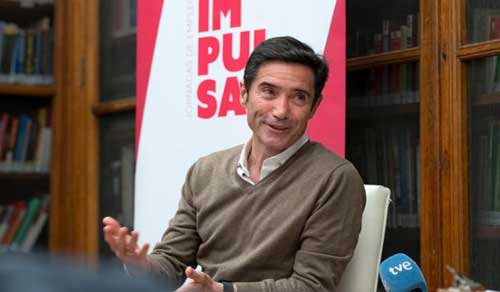
Marcelino García Toral: "I don't believe in DNA in football, you have to respect all the ways of playing"
The football coach participated in IMPULAS, Nebrija University's Employability Conference, and talked with our students about the need for training in everything that is done. [Read more]

